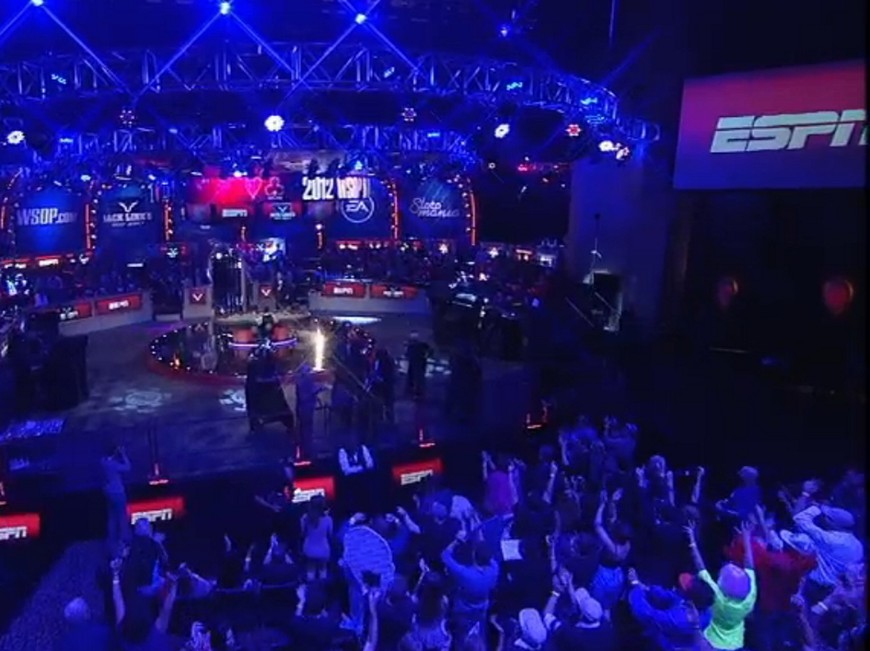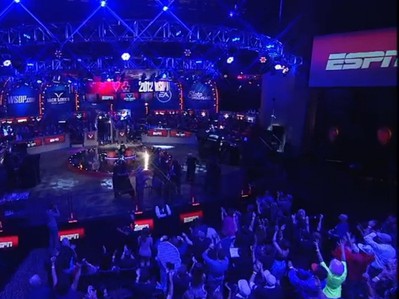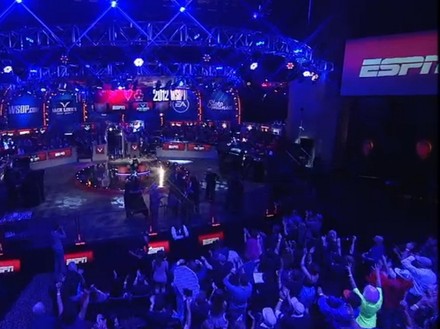


Knowledgeable poker fans were the winner this week as ESPN devoted two full nights of broadcast time to the “October Nine” final table of the 2012 World Series of Poker Main Event.
ESPN’s decision to air continuous play from the finale, on Monday night on ESPN2 and Tuesday night on ESPN itself, proved itself a boon for fans of the game. While some watchers derided this year’s long-form approach for not providing the “shove and pray” jamfest that heavily edited versions of other finales pretend to be, this one had it right.
High-money finales epitomize the long-uttered pokerism about the game being “long periods of boredom, punctuated by moments of sheer terror,” but even the supposedly boring stretches here defined the battle, particularly the record-setting three-way battle between Greg Merson, Jesse Sylvia and Jacob Balsiger.
As Tuesday night’s extended session wore on, the three settled into roles that were almost pre-designed for the matchup: Merson, the dominant force, able to control the action through his will and the chip lead; Sylvia, the primary challenger, needing to parlay his aggression into a game-changer, yet never quite able to find the right opening; and Balsiger, the young usurper, a bit outgunned by the others but willing to battle nonetheless.
That the poker gods saw fit to throw in plenty of coolers and several unlikely suckouts that could have tipped the scales in favor of any of the three players added to the fun.
One of Merson’s secrets to success was his ability to transform the Tuesday night marathon into a small-ball game, where he kept chipping away at his foes in hands where he kept the pot and bet sizes within manageable ranges.
On the flip side, Balsiger went along with the general trend of underbetting the pre-flop raises, to his own subtle detriment. Usually short-stacked and battling uphill, his mininum-bet opening raises made little effective use of the power of the short stack. Only a couple of unlikely suckouts kept him in the fray, though with a couple more, he’d be the champ today, not Merson. Such is poker.
ESPN’s broadcast framework worked very well overall. Lon McEachern’s play-by-play was solid throughout, though the color commentary by Norman Chad and Antonio Esfandiari was uneven at best. Chad’s at his best in a pre-edited format, when his one-liners can be honed for impact, while Esfandiari spent hours frequently misreading the players and mentioning he’d rather be at a party somewhere.
On the breaks, Kara Scott excelled in the sideline reporter/interviewer role, while heads-up specialist Olivier Busquet was handicapped by the final night’s coverage never reaching the heads-up stage until more than ten hours of action was already in the books.
By that point, the blinds themselves had already climbed to the point where the action was basic two- and three-move poker for the title between Merson and Sylvia, robbing Busquet of the opportunity for deeper exploration of the situation.
Overall, however, the ESPN commentators held to their roles well, and let the players themselves be the stars of the moment. The players, to their own credit, let the game itself control the scene as well.
ESPN also made the most of the Penn & Teller Theater “arena” framework, playing up the fans’ participation and partisan rooting at every chance. Some of that tends to be nonsensical, but it’s a fun occasion with big money at stake. There’s no reason for family, friends and backers to not make a party occasion out of it.
What viewers received this time out was a poker broadcast that was really about poker. One can’t help but scratch one’s head at the occasional comments that this year’s WSOP final table was anything other than excellent. It might not be to everyone’s liking, but this was final-table poker as it really is.

